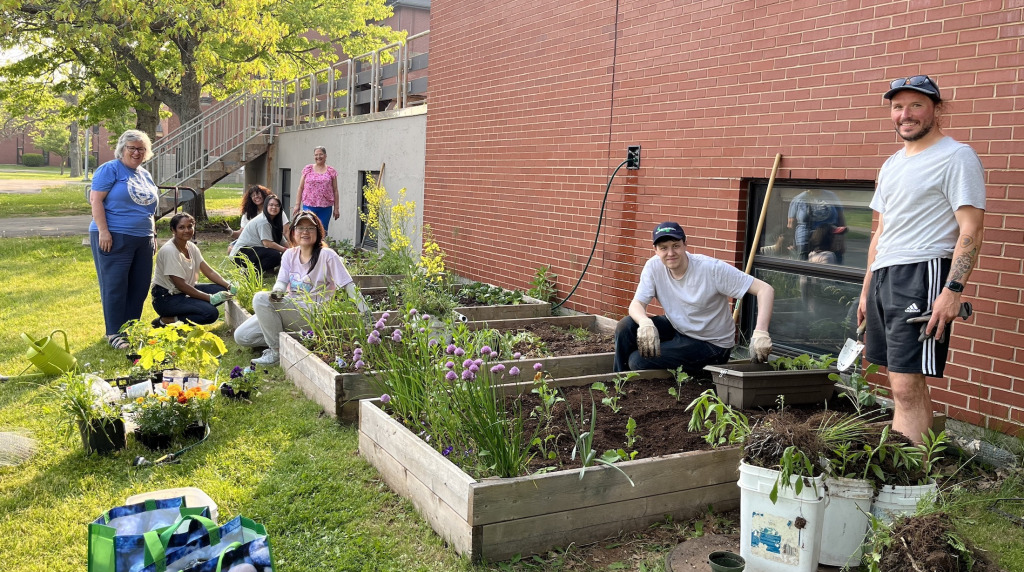UPEI campus volunteers help Saint Dunstan’s Gardens grow again

The UPEI Chaplaincy Centre, with the help of UPEI Experiential Education, recently recruited a volunteer coordinator and a team of student volunteers to take care of Saint Dunstan’s Gardens through the summer months and into early fall. Thanks to the efforts of these volunteers and others, the gardens have now been renewed and planted with a variety of vegetables.
The Chaplaincy Centre manages Saint Dunstan’s Gardens, which comprises raised vegetable garden beds located behind Memorial Hall with the goal to provide vegetables to Soup for the Soul each fall.
Soup for the Soul, a Chaplaincy Centre initiative that began in 2014 with a grant from PEI Health Promotion for healthy eating and mental health, offers UPEI students hot soup lunches prepared by various groups across campus. In 2016, six raised garden boxes were placed outside the Chaplaincy Centre—and that’s when Saint Dunstan’s Gardens was born.
The gardens thrived for a time, with help from partners including The Mount Continuing Care Community and the UPEI Faculty of Education, but when the physical campus closed in March 2020 because of the COVID-19 pandemic, the gardens were left largely unattended.
The Saint Dunstan’s Gardens are now re-established in a new location outside Memorial Hall—the beds were moved there because of flooding issues in their old location. UPEI Chaplain Sister Kidd is grateful for the progress that has been made and for the generosity of local groups and a business—VK Greenhouses donated some of the transplants for the gardens.
“With the kind help of various individuals and groups across campus and in the community, Saint Dunstan’s Gardens are becoming bountiful once again,” said Sister Kidd. “As more people take interest in the project, we are seeing the end goal become a reality, which is to have enough vegetables for Soup for the Soul in the fall, and in turn, to provide healthy meals for UPEI students.”
This spring, Dr. Pamela Courtenay-Hall, professor of philosophy in the UPEI Faculty of Arts and a teaching associate in Environmental Studies, engaged her Environmental Philosophy class in restoring and planting the gardens. She later enlisted the help of a few volunteer students to continue to improve the soil—an effort that appears to be paying off. Dr. Courtenay-Hall said the volunteers, many of whom are international students, share stories of gardening with parents and grandparents with each other and their mentors.
“To offer this experience on campus is a bit like home away from home for them. Everyone wins,” she said.
This year, Barbara Smith, sessional instructor in the Faculty of Indigenous Education, Research, and Applied Studies (IKERAS), plans to integrate a “Three Sisters” garden experiential learning lesson into her course. This type of garden is a traditional companion planting method originating from Indigenous American agriculture. It involves growing corn, beans, and squash together, taking advantage of their symbiotic relationship for mutual benefit. This method maximizes space, increases yields, and reduces the need for fertilizers and pesticides, making it a sustainable and efficient way to garden.
Once the crops planted in the Saint Dunstan’s Gardens are ready to be harvested later this summer, UPEI students will be able to get fresh vegetables at the UPEI Campus Food Bank and the UPEI Chaplaincy Centre until Soup for the Soul resumes in the fall.
To learn more about this wonderful initiative, follow UPEI Saint Dunstan’s Gardens on Facebook and Instagram. New volunteers are always welcome and those interested can email chaplaincy@upei.ca.